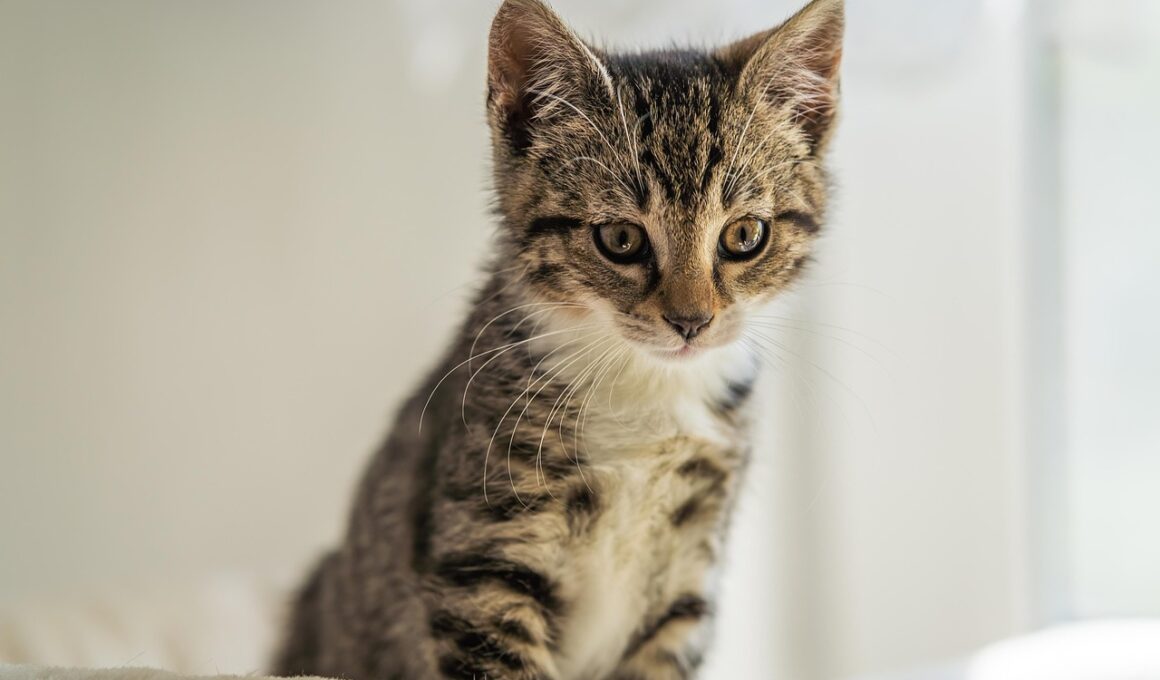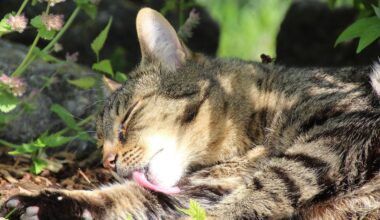Socializing Kittens with Humans: Tips and Techniques
Socializing kittens effectively lays a strong foundation for their training success and overall well-being. Kittens exposed to human interaction at an early age are more likely to become friendly, adaptable adults. Start by introducing your kitten to various environments in a gradual manner. Allow them time to explore their surroundings comfortably. Use positive reinforcement to encourage your kitten’s engagement with you and your family. This may include verbal praise, petting, or small treats for positive behavior. Consistency is also key; this ensures that they understand what behaviors are desirable. You can utilize toys to facilitate interaction between you and your kitten. Feather wands, laser pointers, and other interactive toys can help you engage them in play. The more engaged they are during playtime, the more likely they will view you as a trusted companion. Additionally, make room for socialization with different people. Invite friends or family members to your home, allowing the kitten to interact with various personalities. This exposure helps them build their confidence. Finally, always monitor interactions, and ensure all experiences are positive and rewarding.
Understanding the nuances of kitten behavior is essential for successful socialization. Kittens are naturally curious creatures, and they will often explore their environment. Allowing them to investigate different objects, sounds, and textures promotes confidence. Incorporating new sights, sounds, and scents into their space can make this exploration exciting. Consider using a variety of safe toys with different textures and sounds. This not only engages their curiosity but also teaches them about safe play. Another vital element in socializing kittens is patience. Some kittens may take longer to warm up than others, and each kitten has its own personality. Recognize their individual pace and refrain from forcing encounters. Instead, create positive associations by rewarding them with treats, affection, and praise during interactions. Gradually increase the level of engagement as your kitten becomes more comfortable. It’s also wise to create a designated safe space where your kitten can retreat if it feels overwhelmed. This safe area provides comfort and reassurance during the socialization process. Just remember, the goal of socialization is to ensure your kitten feels secure and confident in its surroundings, enhancing its ability to connect with humans.
Introducing New People to Kittens
When welcoming new individuals into your kitten’s environment, proceed with careful consideration. New people such as friends or family bring unique scents and energy, which can be surprising for a young kitten. Begin by allowing your kitten to observe from a distance. This approach lets them acclimate to the new person without feeling threatened. As the kitten appears interested and curious, gradually move closer. Always encourage the new person to allow the kitten to approach at its pace, thereby eliminating pressure. When the kitten is ready to interact, the adult can offer a hand for sniffing—this is a common feline greeting. Teaching visitors to respect the kitten’s space is vital for mutual comfort. Use positive reinforcement, providing treats or toys to the kitten when it interacts positively with unfamiliar people. Playtime can also facilitate bonding; a toy like a feather wand could be more enticing than a direct approach. As the kitten grows accustomed to various individuals, it will develop valuable social skills. Ultimately, these early experiences shape their behavior towards people throughout their life.
Utilizing playtime is one of the best ways to encourage interactions between your kitten and new individuals. Through play, kittens can build trust and familiarity, which are integral to socialization. Establish a routine involving different interactive toys that foster engagement. For example, when introducing a new friend, encourage them to sit on the floor and engage in light play near the kitten’s territory. This relaxed environment creates a positive association in the kitten’s mind regarding new humans. As they interact with toys, the kitten begins to associate the new person with playful fun rather than anxiety or fear. Additionally, provide treats when the kitten engages positively. Gradually, they will learn to seek out positive interactions with humans. Observing their body language during these encounters is essential; look for signs of amusement or curiosity, such as playful pouncing or vocalizations. If the kitten shows hesitance or withdrawal, it’s crucial to respect their boundaries and allow them space. You can continue to offer toys from a distance. The key is to balance fun while respecting the kitten’s comfort levels to ensure a successful playful association.
Establishing a Routine
Establishing a routine plays a vital role in successfully socializing kittens. A predictable schedule helps manage expectations for both the kitten and its humans. Consider integrating socialization activities into the daily routine. This might include structured playtimes, feeding schedules, and cuddle sessions. Kittens thrive on consistency, and knowing what to expect helps build their confidence. Begin interactions during playtime, as this is often when kittens are most eager to engage. Gradually introduce new experiences, ensuring that each interaction is positive, rewarding, and fun. Incorporating daily training exercises can also coincide with socialization efforts. This can include teaching simple commands through clicker training, reinforcing cooperative behavior, and building trust through one-on-one time. Always be mindful of the kitten’s energy levels. If they seem overwhelmed or overly stimulated, take a break and allow them to recharge in their safe space. Feeling secure enhances their ability to socialize effectively with people and the environment around them. Remember, patience is essential. Commitment to a structured, gradual socialization routine will yield strong results over time and create a lasting bond with your kitten.
To enhance the socialization process, consider involving the kitten in everyday household activities. This inclusion can help them adapt to the various sounds, sights, and smells present in a typical human environment. Allow the kitten to follow you from room to room, ensuring it feels secure alongside you. Use everyday tasks like cooking or cleaning as opportunities for fostering familiarity. For instance, chatting softly while performing chores reassures the kitten of a calm presence. Furthermore, encourage family members to interact with the kitten during these activities—sharing tasks while offering attention promotes social bonds. By exposing the kitten to different daily routines, it learns to adjust more easily and builds its comfort level as it becomes accustomed to people’s movements and voices. It may also help prevent fearful behavior later in life. As the kitten becomes more adept at handling varied experiences, leveraging these unique moments will enhance agility and confidence. This knowledge can play an essential role when introducing the kitten to situations beyond the house, reinforcing positive connections and comfort with people as they grow.
Long-Term Benefits of Early Socialization
Successful socialization during kittenhood provides lifelong benefits for both the feline and its human companions. Kittens that undergo thorough socialization early are typically more adaptable and confident as adults. This adaptability can mitigate issues such as fearfulness and aggression, which are unfortunately common in cats that lack early socialization experiences. With the proper groundwork laid during kittenhood, these cats tend to be better companions, forming closer bonds with their families. They are also generally more relaxed when being exposed to unfamiliar environments or individuals in the future. Moreover, well-socialized cats are easier to train, as they exhibit greater willingness to learn and cooperate. This is particularly beneficial for their lifelong habits, leading to decreased stress for both the feline and its human family. Another key aspect is that socially well-adjusted cats can often participate more successfully in interactions with other pets. Socialization creates vital communication skills between pets, contributing to a harmonious multi-pet household. The effort spent on early socialization truly pays off, and the rewards extend well into their adult life. Investing time in these early interactions will certainly yield lasting, joy-filled relationships.
In summary, socializing kittens is a vital aspect of their development, contributing to their behavior and well-being. Exposure to different people, environments, and experiences significantly shapes their personality and adaptability. Utilizing consistent routines, positive reinforcement, and playful interactions will lay a strong foundation, facilitating their comfort during various encounters. While the process may take time, patience remains an essential virtue in successful kitten socialization. Observing their behavior and acknowledging their needs ensures that the experience remains stress-free. By integrating socialization into daily tasks and creating a structured routine, kittens will become well-adjusted adults capable of thriving in varied situations. Together, you and your kitten can forge a trusting, positive relationship, paving the way for meaningful interactions throughout their life. As they grow, your effort will transform into an enriched connection that fosters companionship. Ultimately, taking steps to socialize your kitten enhances their quality of life, ensuring they blossom into confident, loving pets. Remember, every positive experience counts, making it easier for both you and your furry friend to embrace the joy of companionship.


